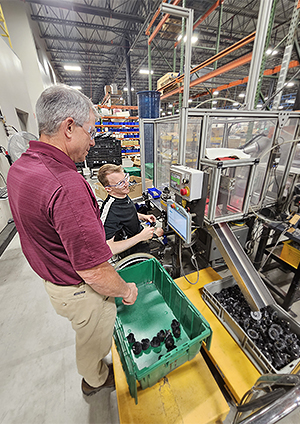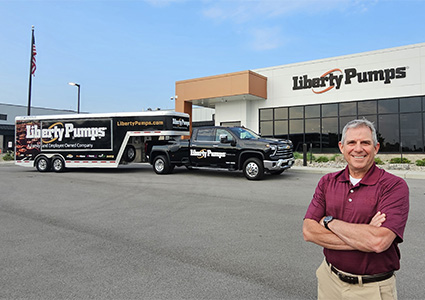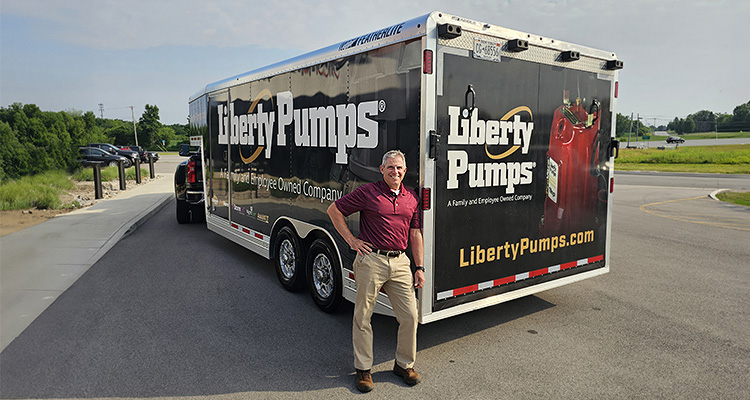With innovation at its core, Liberty Pumps has grown to a position of market dominance
As a leader in the wastewater industry, Liberty Pumps (Liberty) has a strong portfolio, with products for residential, commercial, and municipal applications. With a history of family ownership, and more recently, employee ownership, Liberty fosters a positive working culture that extends to its team members and the wider community in which it operates.
“Liberty was established in October 1965 when Fred Cook took over an existing line of pumps and located operations in his hometown of Bergen, New York,” begins Don Cunningham, Director of Manufacturing. “Over the coming years, Fred advanced the business from a basic sump pump manufacturer to include preassembled packages that handle sewage.
 “By 1972, the business had doubled in size and Fred’s nephew, Charlie Cook, came onboard, later taking over operations when Fred retired in 1975. Further innovations like new sewage pump models and systems caused the company to grow and strengthened its product offerings in the wastewater industry. Ongoing success took Liberty from its humble beginnings in a 2600-square-foot site in 1965 to the current state-of-the-art manufacturing facility it operates today.”
“By 1972, the business had doubled in size and Fred’s nephew, Charlie Cook, came onboard, later taking over operations when Fred retired in 1975. Further innovations like new sewage pump models and systems caused the company to grow and strengthened its product offerings in the wastewater industry. Ongoing success took Liberty from its humble beginnings in a 2600-square-foot site in 1965 to the current state-of-the-art manufacturing facility it operates today.”
To support such growth, the company moved three times, all to larger sites, but remained in the original township where Fred found initial success. “As previous locations expanded to maximum capacity for the lot size, new locations became necessary,” Don confirms. “The original location expanded to around 5500 square feet before we moved to a 24,000-square-foot site, which we later expanded to 35,000 square feet. In 2000, Liberty relocated to the newly developed industrial park, Apple Tree Acres, taking the total footprint to 60,000 square feet.
“Business continued to boom, and three more expansions occurred, with the latest addition of 86,000 square feet of new warehouse and 21,000 square feet of added production space being completed in early 2023. This facility houses all operations, including sales, marketing, order processing, engineering, production, warehousing, and manufacturing space for machining, powder coating, assembly, shipping, and receiving. These expansions bring our current total manufacturing footprint to 193,000 square feet. While there are no immediate plans for expansion, we still have existing land base for further strategic development in the future.”
Turning to Liberty’s product portfolio, Don says: “We offer everything from basic sump and utility pumps to a full suite of sewage pumps and systems. Beyond basic standard pump models, we also offer monitoring accessories, alarms, basins, back-up models, and customized tank packages configured for specialized applications.
“I believe that any strong business has two keys for success: its customers and its members,” Don states. “Liberty is no exception, but where we are different is the ways in which we treat both our customers and our members. Alongside our high-quality products, we deliver high value with quick delivery and unparalleled customer support.
“Our approach to service is a commitment to listening; listening to what customers want and then bridging industry gaps with innovative new products. This extends to our members too, as we recognize that they are the greatest resource for ideas and improvements across the business, whether it’s a recommendation for safety, strategic planning, or just having some fun, listening is mission critical.
“Everything we offer is intended to retain and attract talent,” he states. “Beyond providing good compensation and tuition reimbursement, we foster an excellent work environment and maintain a robust suggestion program that drives several changes and improvement projects. We encourage team members to respect and care for one another, weaving a level of love through our workplace family. As an employee-owned trust, our members are not only employees, but owners, which helps foster loyalty and interest in seeing continued success.” 
When it comes to technology, Liberty is constantly analyzing where, when, and how to best utilize new innovations. “We’ve introduced what we call smart testing to our production cells, which tightens the parameters around product performance and quality by capturing any process variations and rejecting data in a simplified operator platform,” Don elaborates. “Such data is then used as valuable information for continuous improvement efforts.
“We experienced the benefit of implementing robots into some areas of production around seven years ago. With no intention to displace any team members, the goal was to provide more efficient tools and methods to accomplish the needs of sales growth. The initial experience was like striking gold, and we immediately explored more applications.
“Assembly tools are becoming more sophisticated with programmability and data retention, and we’ve also made significant investment in drivers and torque tools that can be set to specific parameters for assembly consistency and enhanced productivity. While production gains and lower cycle times from the introduction of technology are always welcomed, the reduction of repetitive movements and operator fatigue is equally as important.
“Today, we have two CNC machining centers that are tended by Fanuc robots, with a third machine being integrated later this year,” he adds. “Our aggressive focus on growth in the larger, higher horsepower pump market drives projects with heavier parts and assemblies, increasing ergonomic risks for operators. However, through the implementation of collaborative or traditional robots to perform assembly functions, we can reduce or even eliminate such risks.”
As our conversation draws to a close, Don concludes: “For the remainder of 2024, we’re hoping to see the successful trajectory we’ve historically enjoyed, with a continued focus on customer satisfaction and member engagement across the team. We will continue to be a destination workplace where every member is valued through a healthy and respectful culture, guided by great leadership.
“With a successful foundation, we can persist with treating people right, which extends to our customers and the wider community. Throw high-quality, reliable products into the mix and we have the core that breeds success. In terms of the factory, we will continue to implement automated systems and processes to promote a safe and highly productive operation that fuels our continued market dominance with innovative products.”
